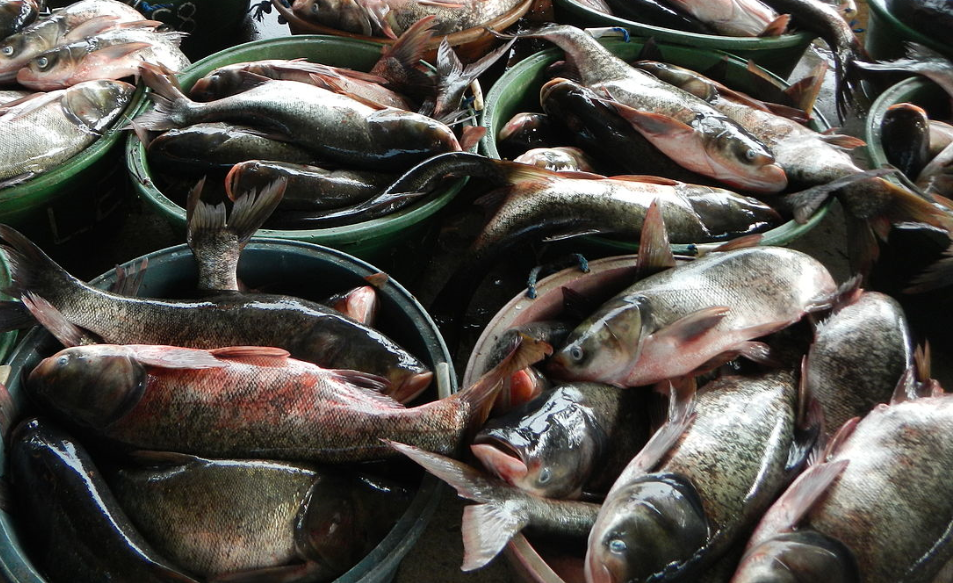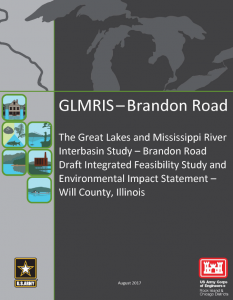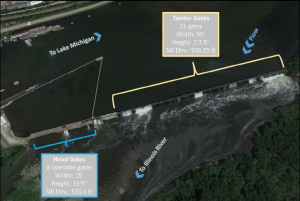
The Army Corps of Engineers’ most recent study to stop or at least slow the advance of Asian carp toward the Great Lakes was released on Monday.

Brandon Road Study courtesy of glmris.anl.gov
What’s known as the Brandon Road study was years in the making. It cost $8 million, and the preferred option proposes a number of deterrent measures that come with a price tag of $275 million.
Responses to the study followed predictable talking points.
Michigan Sen. Debbie Stabenow praised its release on her website saying, “It’s urgent that we move as quickly as possible to get permanent solutions in place.”
Ohio Sen. Rob Portman said, “It is important that the Corps remains on schedule to finalize the plan by January of 2019, and I look forward to working with stakeholders and the Corps to do just that.”
But one senator merits watching on this issue and that’s Illinois’ four-term Democrat, Dick Durbin.
On the Army Corps’ study, Durbin’s statement was mostly a swipe at the Trump administration for the “unexplained five-month delay.” He urged the administration to move the plan “towards the end goal of preventing the spread of Asian carp.”
Durbin’s statement said nothing about the substance of the report.
Long history with Asian Carp

Illinois Senator Dick Durbin, courtesy of durbin.senate.gov
Durbin’s work on stopping Asian carp goes back to 2003 when he secured funding for the first electric barriers to repel the carp in the Chicago waterways. Environmental activists got Durbin’s attention on the seriousness of the problem and Durbin rallied support to secure the funding.
Everyone knew the barriers were a stop-gap measure, yet they were content to let them be the sole deterrent.
Then the world changed in 2009 when Notre Dame biologists working with a new tool – environmental DNA — found traces of eDNA for Asian carp past the electric barriers that were supposed to stop them.
Overnight the region had to face the reality that the electric barriers could not be the final fix.
Alarms went off around the region and pressure mounted for a permanent solution to not only stop the carp, but also the movement of other invasive species that traverse the aquatic highway from the Mississippi River to the Great Lakes and back.
The fix?
Physical separation of the Great Lakes from the Mississippi River.
Do that and you stop the invasive species traffic, get new infrastructure, and yes: commercial barge traffic on the waterways will have to adapt.
But two huge problems will be solved.
The assignment to research the separation solution fell to the Army Corps and in 2014 it released the results of its research and findings on feasibility, cost and timing. The Corps provided options but made no recommendations.
The result? Physical separation was feasible, but it came with an $18 billion price tag and would take decades.
Durbin was having none of it.
He quickly issued a statement that he had no interest in a multi-billion-dollar Army Corps project that would play out over decades. He said he’d seen too many of them languish.
To say Durbin’s public lack of interest in the separation project killed it would be an exaggeration but practically speaking, it did.
You see, Durbin is more than just one of 16 Great Lakes senators. He’s the number two ranking senate Democrat. He’s on the Appropriations Committee – the folks who fund the government and decide which bills get money and how much.
He’s a big deal and he has Great Lakes credibility.
Durbin was a supporter of Great Lakes restoration way back in the G.W. Bush era before it became accepted as part of the regional fabric as it is today. He was a go to guy in D.C. when it was hard for environmental groups to be heard.
That’s why how Durbin proceeds on the Brandon Road study matters. His influence can help move it along and may even quicken the pace.
But tepid support or damning the study with faint praise sends a signal to colleagues who are not close to the issue that it’s less worthy of their attention.
And Durbin has to contend with his constituencies in Illinois who may not want the Army Corps tinkering with its waterways.

Molly Flanagan, Vice President, Policy Alliance for the Great Lakes, courtesy of greatlakes.org
Molly Flanagan is the top policy executive for the Chicago-based Alliance for the Great Lakes and she recently explained the state of Illinois’ stance on the Brandon road study to a group of Great Lakes journalists. “Illinois has done everything within its power to keep the Brandon Road study from being released to the public,” Flanagan said.
Durbin will have to reconcile his position with that sentiment.
Flanagan’s briefing was sponsored by the non-profit Institute for Journalism & Natural Resources.
Great Lakes Now contacted Sen. Durbin’s office to gauge his level of support for the Brandon Road study and the response was non-committal.
“It’s premature to get into potential support for the tentatively selected plan before the public has had their chance to weigh in. However, it’s fair to say the Senator looks forward to having a final recommendation with input from the Corps, the public, and other stakeholders,” Durbin’s media representative John Normoyle said.
Normoyle noted that Durbin recently took legislative action to force release of the study.
Here’s another reason why Durbin is a critical player on Asian carp and the Brandon Road study: the Army Corps’ timeline says any decision by the Corps won’t be final until mid-2020, well after the 2018 federal election cycle.
There are seven Great Lakes senators who have to stand for re-election in 2018 including Great Lakes and Brandon Road champion, Debbie Stabenow from Michigan.
Durbin’s term isn’t up until 2020.
Elections are hard to predict – see the presidential race in 2016.
If the Brandon Study makes it as far as congressional action, Durbin could be the last Great Lakes senator standing who understands the historical importance of protecting the Great Lakes from aquatic invaders.
Note from Great Lakes Bureau Chief Mary Ellen Geist: How do you stop an Asian Carp? Shock them, blast them with noise, then turn on the water jets. For more on how the Army Corps of Engineers plans to keep the Asian Carp from getting in to the Great Lakes, Detroit Public Television’s Christy McDonald talked with Drew YoungeDyke at the National Wildlife Federation’s Great Lakes Regional Center in Ann Arbor to get his take on the plan.





